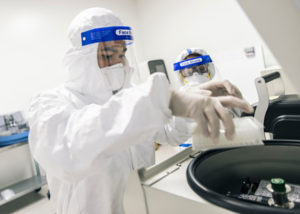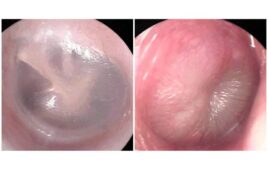
Amazon Diagnostics’ lab in Hebron, Kentucky [image courtesy of Amazon]
Senior-level job postings offer a glimpse of the notoriously secretive and ambitious tech company’s global aspirations for medical diagnostics. Just this week, Amazon put a call out for a medical regulatory officer to be based in Seattle, where the online retailer and cloud computing company is headquartered.
“Regular testing on a global scale across all industries would both help keep people safe and help get the economy back up and running,” Amazon said in the job description, mirroring language in others posted earlier in August. “But, for this to work, we as a society would need vastly more testing capacity than is currently available. Until we have an effective vaccine available in billions of doses, high-volume testing capacity would be of great help, but getting that done will take collective action by many different organizations. For our part, Amazon has been building incremental testing capacity to deal with the COVID-19 pandemic.”
Other new or recently updated job postings for Amazon’s diagnostics operations include titles such as global commodity manager, clinical lab manager, business development manager, senior program manager, senior product manager for payments and technical senior product manager.
Amazon’s medical regulatory officer would work with developers of new diagnostic tests or processes and serve as the sole contact with key regulators, building relationships with agencies “to enhance lines of communication, including appropriate collaborations to discuss novel processes or lines of business which do not fit comfortably within the existing regulatory framework.”
“We’re seeking an individual who has the experience to navigate existing regulatory waters but who also has the skills and savvy to chart ambiguous or new territory with local, state, and national regulators for clinical diagnostics,” Amazon said in the posting.
Amazon’s medical regulatory officer would also “build a team to monitor changes in local, state, and federal/national regulations, and manage that team to drive revised or new process changes to maintain regulatory compliance” and collaborate with Amazon business lines such as Amazon Care, Pharmacy, Amazon Web Services (AWS), Alexa and Devices.
The medical regulatory officer job posting does not name the position’s direct supervisor. Amazon on Friday said it did not have more information to share about its diagnostic plans.
“We are excited to enable regular testing on a global scale, but here at Amazon Diagnostics it remains Day 1,” Amazon said in some of the job postings, referring to the company’s fast-moving, customer-centric business model. “We have much more work to do to help improve the medical diagnostics experience for customers, and connect them with the treatment and care they need.”
Amazon won emergency use approval for its own COVID-19 test collection kit in June and started selling them to customers in July. The company says it has processed millions of COVID-19 tests for employees and customers at its two diagnostic labs in Hebron, Kentucky (adjacent to Amazon’s new air cargo hub at Cincinnati/Northern Kentucky International Airport) and Greater Manchester, England.
Amazon’s core competitive competencies — convenience, cost and speed — seem ideal for medical diagnostics. For example, Amazon’s $40 COVID-19 test can be delivered to a customer’s home as soon as a few hours after ordering, and it comes with free next-day shipping to the lab, which promises results within 24 hours of receiving the sample.
Amazon might be eying more than just COVID diagnostics. In July, the company disclosed new ownership of nearly 1.46 million shares of Seattle-based Nautilus Biotechnology (NASDAQ: NAUT), a pre-revenue startup working to identify, count and analyze the constantly changing number and kind of proteins in the human body.
“Much as democratizing access to the genome was a catalyst for the development of a broad, vibrant, and healthy genomics ecosystem, we believe that Nautilus’ proteomics innovation has the potential to unlock high-value applications in precision and personalized medicine, in drug discovery, and in diagnostics,” Nautilus Biotechnology CEO Sujal Patel told investors earlier this month.
Amazon hasn’t said whether it is working with Nautilus, but Amazon has clear business relationships with the two other companies listed in the same investment holdings disclosure.
Nautilus plans to use cloud-based machine-learning to analyze massive amounts of data, and in recent job postings has sought software engineers who have experience with Amazon’s AWS cloud computing infrastructure. One software engineer joined Nautilus from AWS in August, according to his LinkedIn page, while Nautilus CFO Anna Mowry served as senior manager of worldwide operations, commercial sales at AWS in 2014.
Amazon founder Jeff Bezos even invested in Nautilus through his Bezos Expeditions family office last year, before Nautilus went public through a merger with a special purpose acquisition company (SPAC). But it was news of Amazon’s investment this summer that triggered a Nautilus buying spree, pushing the stock price up so fast that trading was temporarily halted.




